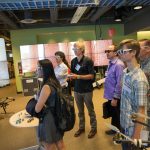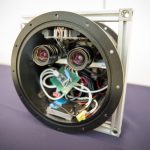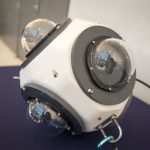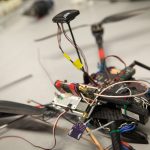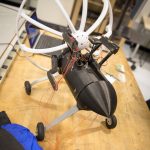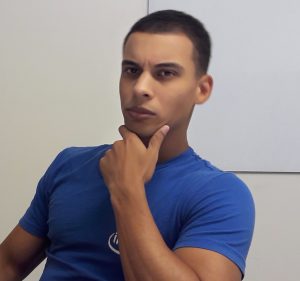 Michael Barrow was one of 14 students awarded the new SIGHPC/Intel fellowship. ACM’s Special Interest Group on High Performance Computing (SIGHPC), in collaboration with Intel, established the fellowship to increase the diversity of students pursuing graduate degrees in data science and computational science, including women as well as students from racial/ethnic backgrounds that have not traditionally participated in the computing field. The fellowship starts in August, but Mike will be recognized during the high performance computing community’s flagship Super Computer (SC) conference this November. Mike’s research focuses on developing high performance vision systems to aid surgeons during operations.
Michael Barrow was one of 14 students awarded the new SIGHPC/Intel fellowship. ACM’s Special Interest Group on High Performance Computing (SIGHPC), in collaboration with Intel, established the fellowship to increase the diversity of students pursuing graduate degrees in data science and computational science, including women as well as students from racial/ethnic backgrounds that have not traditionally participated in the computing field. The fellowship starts in August, but Mike will be recognized during the high performance computing community’s flagship Super Computer (SC) conference this November. Mike’s research focuses on developing high performance vision systems to aid surgeons during operations.
Author Archives: Ryan
European (Research) Vacation
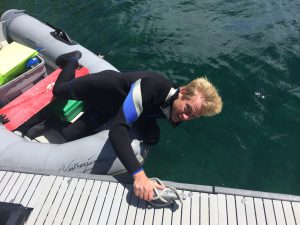 Perry will be spending next year at ISTerre in Grenoble, France working on part of his thesis under Dr. Philippe Roux. Perry received support through the NSF Graduate Research Opportunities Worldwide (GROW) program, the Chateaubriand STEM Fellowship, and the Friends of the International Center Scholarship to encourage this international collaboration. Dr. Roux performed many of the early experiments that inspired Perry’s thesis – using ambient acoustic noise in the ocean for relative localization of moving receivers. Perry is excited to expand many of these theories under Dr. Roux’s supervision and is busy collecting data with Autonomous Underwater Explorers this summer to provide new datasets to study.
Perry will be spending next year at ISTerre in Grenoble, France working on part of his thesis under Dr. Philippe Roux. Perry received support through the NSF Graduate Research Opportunities Worldwide (GROW) program, the Chateaubriand STEM Fellowship, and the Friends of the International Center Scholarship to encourage this international collaboration. Dr. Roux performed many of the early experiments that inspired Perry’s thesis – using ambient acoustic noise in the ocean for relative localization of moving receivers. Perry is excited to expand many of these theories under Dr. Roux’s supervision and is busy collecting data with Autonomous Underwater Explorers this summer to provide new datasets to study.
Design@Large Seminar
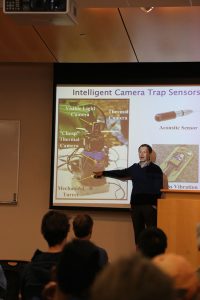 Ryan gave an invited talk at the UCSD Design Lab‘s Design@Large Seminar. The talk went through the history of three of our projects – building technology for behavioral animal monitoring, documenting Maya culture, and coral reef visualization. We have certainly gone through a lot of different prototypes, and made a number of good (and bad) design decisions in developing the technology for these projects. The entire talk was recorded and viewable on the Design Lab Youtube channel.
Ryan gave an invited talk at the UCSD Design Lab‘s Design@Large Seminar. The talk went through the history of three of our projects – building technology for behavioral animal monitoring, documenting Maya culture, and coral reef visualization. We have certainly gone through a lot of different prototypes, and made a number of good (and bad) design decisions in developing the technology for these projects. The entire talk was recorded and viewable on the Design Lab Youtube channel.
NSF REU Site Renewal
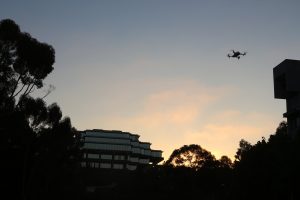 The National Science Foundation recently renewed our Engineers for Exploration summer research program. The funding allows us to bring in 10+ undergraduates from around the country for a 10 week summer experience focusing on building technology to aid in ecology, biology, oceanography, and archaeology. The students partake in cyber-physical systems research motivated by real world challenges in exploration and scientific discovery. The program for this summer starts June 20.
The National Science Foundation recently renewed our Engineers for Exploration summer research program. The funding allows us to bring in 10+ undergraduates from around the country for a 10 week summer experience focusing on building technology to aid in ecology, biology, oceanography, and archaeology. The students partake in cyber-physical systems research motivated by real world challenges in exploration and scientific discovery. The program for this summer starts June 20.
Related Links: NSF Award Announcement, Engineers for Exploration Website
Southern California Robotics Symposium
The first Southern California Robotics Symposium was recently held at the Qualcomm Institute at UCSD. The event brought over 200 people from industry, academia and private research institutes to present and discuss cutting-edge research. Our group was well represented with demonstrations of our Engineers for Exploration projects, our underwater imaging prototypes, and data visualizations from our various expeditions.
- Perry showing 3D visualizations
- Underwater Stereo Camera Rig
- The underwater SphereCame
- Radio collar tracker drone
- Autonomous paraglider
Fast and Efficient Geohashing
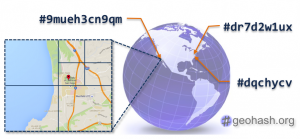 Spatiotemporal analytics — the time and place that you tweet, post, and login — is getting increased interest in data science research. Geohash is a novel and efficient way to provide a location in lieu providing a latitude and longitude. As described in the recently published paper, “Spatial Predicates Evaluation in the Geohash Domain Using Reconfigurable Hardware””, Geohash operations are ripe for implementation on an FPGA due to its bit-level encoding system. This paper was published at the IEEE International Symposium on Field-Programmable Custom Computing Machines (FCCM). Dajung worked on this research project last summer during her internship at IBM Research. Dajung presented the work at FCCM. Congrats to Dajung and her co-authors Roger Moussalli, Sameh Asaad, and Mudhakar Srivatsa.
Spatiotemporal analytics — the time and place that you tweet, post, and login — is getting increased interest in data science research. Geohash is a novel and efficient way to provide a location in lieu providing a latitude and longitude. As described in the recently published paper, “Spatial Predicates Evaluation in the Geohash Domain Using Reconfigurable Hardware””, Geohash operations are ripe for implementation on an FPGA due to its bit-level encoding system. This paper was published at the IEEE International Symposium on Field-Programmable Custom Computing Machines (FCCM). Dajung worked on this research project last summer during her internship at IBM Research. Dajung presented the work at FCCM. Congrats to Dajung and her co-authors Roger Moussalli, Sameh Asaad, and Mudhakar Srivatsa.
Tinker @ FCCM
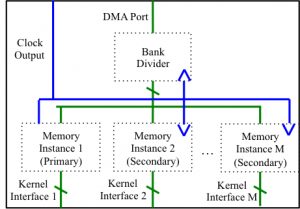 Our paper, Tinker: Generating Custom Memory Architectures for Altera’s OpenCL Compiler was accepted at IEEE International Symposium on Field-Programmable Custom Computing Machines (FCCM)! Deploying High Level Synthesis hardware design tools and integrating them with existing interfaces is a major challenge. In this paper we introduce Tinker, an open-source Board Support Package generator for Altera’s OpenCL Compiler. Board Support Packages define memory, communication, and other ports for easy integration with high level synthesis cores. Tinker abstracts the low-level hardware details of hardware development when creating board support packages and greatly increases the flexibility of OpenCL development. Tinker allows users to generate custom memory architectures, providing a new method for kernel optimization that was not available before. Congratulations to the authors: Dustin, Matt, Jeremy, Kevin, and Ryan!
Our paper, Tinker: Generating Custom Memory Architectures for Altera’s OpenCL Compiler was accepted at IEEE International Symposium on Field-Programmable Custom Computing Machines (FCCM)! Deploying High Level Synthesis hardware design tools and integrating them with existing interfaces is a major challenge. In this paper we introduce Tinker, an open-source Board Support Package generator for Altera’s OpenCL Compiler. Board Support Packages define memory, communication, and other ports for easy integration with high level synthesis cores. Tinker abstracts the low-level hardware details of hardware development when creating board support packages and greatly increases the flexibility of OpenCL development. Tinker allows users to generate custom memory architectures, providing a new method for kernel optimization that was not available before. Congratulations to the authors: Dustin, Matt, Jeremy, Kevin, and Ryan!
You can download Tinker from the Git Repository: Tinker Git Repo
Antonella Awarded Explorers Club Grant
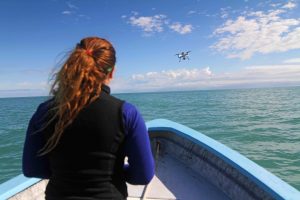 Antonella was recently named a recipient of The Explorers Club 2016 Exploration Fund Grant, for her work developing technologies to monitor the endangered vaquita porpoise. This highly-competitive grant is intended to fund “exploration and field research for those who are just beginning their research careers.” The grant will fund her continuing fieldwork in Mexico, using drones and underwater cameras in an effort to capture the first-ever underwater photos of the vaquita. This summer, Antonella will travel back to San Felipe, Baja California, to deploy the SphereCam and other technologies she has engineered. This work will provide leading vaquita researchers with a better understanding of vaquita and its behavior.
Antonella was recently named a recipient of The Explorers Club 2016 Exploration Fund Grant, for her work developing technologies to monitor the endangered vaquita porpoise. This highly-competitive grant is intended to fund “exploration and field research for those who are just beginning their research careers.” The grant will fund her continuing fieldwork in Mexico, using drones and underwater cameras in an effort to capture the first-ever underwater photos of the vaquita. This summer, Antonella will travel back to San Felipe, Baja California, to deploy the SphereCam and other technologies she has engineered. This work will provide leading vaquita researchers with a better understanding of vaquita and its behavior.
Outstanding Community Leader Award
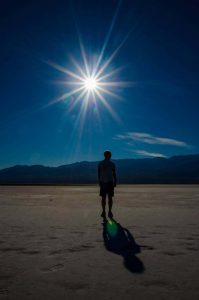 Dustin was recognized with the GSA Outstanding Community Leader Award. This is given by the UCSD Graduate Student Association. This award “honors a UC-San Diego student, staff, or faculty who has displayed unwavering dedication to improving and organizing their community. Through diligent attention to organization and motivation, the awardee has made significant and tangible advances in the lives of their colleagues or neighbors in the UC-San Diego community.” Dustin has done a number of things to make the CSE community better and stronger including aiding in the renovation of Chez Bob and helping organize the prospective graduate student visit day. Congratulations Dustin!
Dustin was recognized with the GSA Outstanding Community Leader Award. This is given by the UCSD Graduate Student Association. This award “honors a UC-San Diego student, staff, or faculty who has displayed unwavering dedication to improving and organizing their community. Through diligent attention to organization and motivation, the awardee has made significant and tangible advances in the lives of their colleagues or neighbors in the UC-San Diego community.” Dustin has done a number of things to make the CSE community better and stronger including aiding in the renovation of Chez Bob and helping organize the prospective graduate student visit day. Congratulations Dustin!
Michael Barrow awarded Engineering Leadership Fellowship
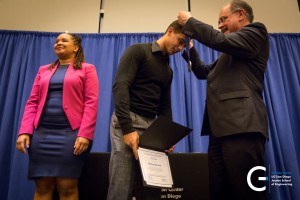 Michael was awarded one of the three fellowships this year in recognition of his collaborations with the medical school, structural, mechanical, and computer science departments to improve patient safety in minimally invasive surgery as well as his work with the NSF supported Early Research Scholarship Program leading 8 teams of undergraduate students. The purpose of the awards program is to reward and recognize successful leaders and to promote positive role models for Jacobs School of Engineering students. Recipients of the award are first nominated by mentors and are then chosen through a competitive selection process. The selection focuses on demonstrated excellence in leadership, engineering ability, communication skills and teamwork.
Michael was awarded one of the three fellowships this year in recognition of his collaborations with the medical school, structural, mechanical, and computer science departments to improve patient safety in minimally invasive surgery as well as his work with the NSF supported Early Research Scholarship Program leading 8 teams of undergraduate students. The purpose of the awards program is to reward and recognize successful leaders and to promote positive role models for Jacobs School of Engineering students. Recipients of the award are first nominated by mentors and are then chosen through a competitive selection process. The selection focuses on demonstrated excellence in leadership, engineering ability, communication skills and teamwork.
